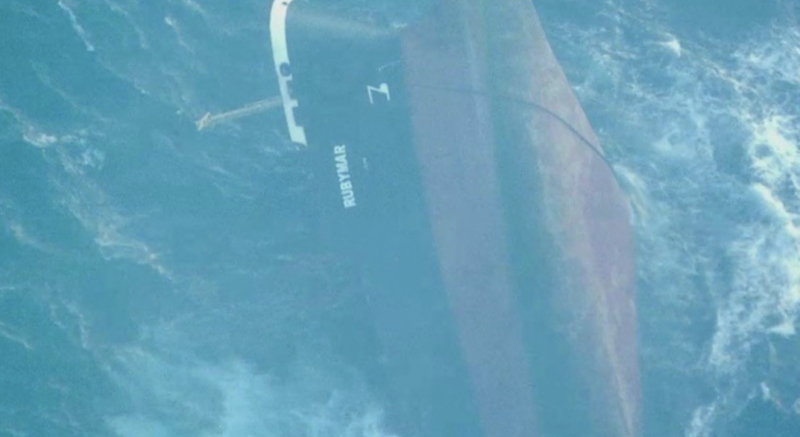
The bow of the Rubymar visible as the ship continues to sink in the Red Sea, in Mar. 2024. (Credit: AFP)
On Feb. 24, four underwater cables were damaged in the Red Sea. While these infrastructures carry the overwhelming majority of Internet traffic between Asia and Europe, the incident suddenly affected 25 percent of data traffic.
On Feb. 26, the Israeli financial daily Globes suggested that the Houthis deliberately damaged the cables. Since mid-November, rockets fired by the Yemeni rebels, supported by Tehran, targeted ships in the Red Sea and Gulf of Aden that they deem linked to Israel, in solidarity with the Palestinians.
On the other hand, groups of the “Axis of Resistance” accused the Americans and the British, who are present in the waters off Yemen as part of Operation Prosperity Guardian.
Thus, blame over the incident has been exchanged, and is part of a media warfare against the backdrop of the Gaza war.
A designated culprit
After the Israeli press accused the Yemeni rebels of cutting underwater cables, the UN-recognized government in Aden was quick to join the accusations, adding that it was intentional.
The Houthis denied all accusations and laid the blame at the Western forces’ door. The West has since December struck the Houthi interests in Yemen on several occasions and intercepted numerous projectiles fired from Yemen. It is also a way of mobilizing Yemenis, who have been fed on anti-US propaganda.
Today, observers seem to agree on another hypothesis. The UK-registered bulk carrier Rubymar, operated by a Lebanese company and abandoned by its crew after it got struck by a rocket on Feb. 18, dropped its anchor before drifting and sinking on March 2. The anchor dragging is thought to have disabled the cables.
A similar incident occurred off the Kenyan coast in 2012, near the port of Mombasa, when an underwater internet cable was accidentally severed by a ship’s anchor, cutting off network access to six African countries. It took three weeks to repair the damaged cable.
“The article in the Israeli newspaper Globes was very quick to draw conclusions based on the information available the day after the incident. However, this information was widely reported in the world press, without being verified or confirmed,” said Nicholas Brumfield, a Yemen researcher.
However, the telecommunications department of the Houthi authority in Sanaa, which is not recognized by the international community, quickly denied that the group was responsible for disrupting the cables and stated that it is “keen to preserve all underwater telecommunications cables.”
But the incident echoes a pre-existing fear that the rebels are using the network for their ends. “This is not a new fear in Yemen,” said Brumfield. “Regularly reported incidents on terrestrial infrastructure and cables are often reported as Houthi attacks, although they are often small-scale local sabotage or simple malfunctions.”
Are repairs in sight?
As a sign of goodwill, the Houthis stated that repair ships would be authorized to enter the zone without being subject to the same traffic restrictions as Western commercial vessels.
“The rebels largely control the Yemeni telecommunications sector, as most of the companies are based in Sanaa,” said the researcher. “They also have a stranglehold on part of the internet infrastructure in the government-controlled territory.”
While the cables cut had no impact on transcontinental communications, they rapidly deteriorated Internet service in India, Pakistan and parts of East Africa. The telecoms companies affected, such as HGC Global Communications, said they had quickly taken steps to re-route data traffic.
While White House National Security Communications Adviser John Kirby ruled out the idea of a sabotage or direct strike by the Houthis on Wednesday, his administration nonetheless held them responsible, as the group was put back on the US list of terrorist organizations in January.
“We currently assess that the damage sustained to the undersea cables in the Red Sea is a result of the Houthis’ Feb. 18 missile attack against the M/V Rubymar, which has now sunk,” a defense official told Al Arabiya English on Wednesday.
This article was originally published in L'Orient-Le Jour. Translated by Joelle El Khoury.